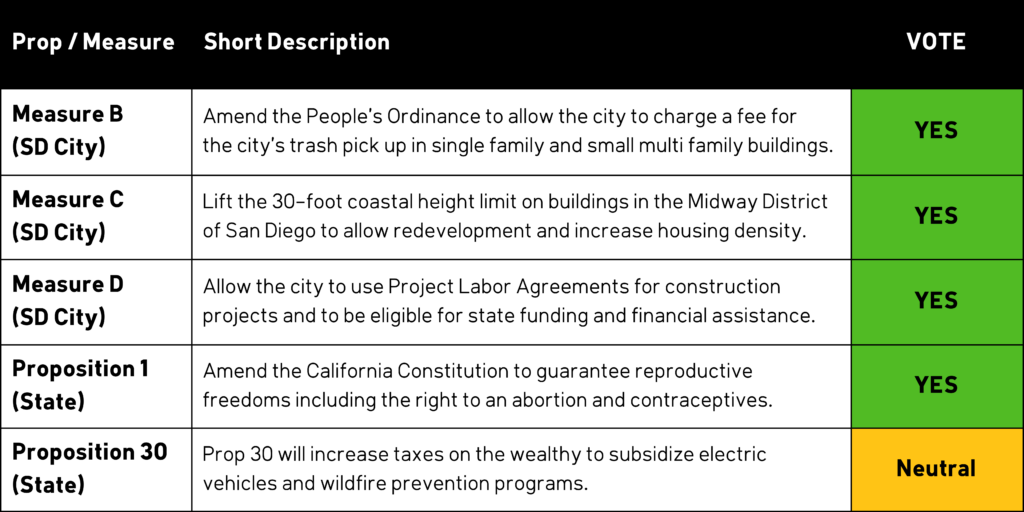SanDiego350 primarily takes positions on measures that relate directly to climate change, but we have also taken positions on some measures which relate to reforms we feel are important in working towards social justice. We believe that in order to achieve climate justice, we must also achieve social justice. Below is a summary of our positions, followed by a brief rationale for each one. Feel free to share our recommenda- tions with others. To learn more about registering to vote and casting your ballot, check out our voting guide.
Watch our discussion on these measures with Climate Hub partners here.

Measure B – Amend People’s Ordinance to ensure equitable trash costs: YES
City of San Diego Measure: Vote YES to amend the outdated People’s Ordinance and create a more equitable system for recovering trash pick up costs. San Diego is the only major city in the US that does not charge homeowners for trash pick up. Multi-family buildings are charged, meaning that renters and condo-owners are paying for a service that single family home owners get for free. Measure B is a necessary tool for incentivizing waste reduction and meeting CAP, composting and zero waste goals. The measure doesn’t identify specific costs; it initiates a transparent public process for determining how to make our waste collection costs more equitable and sustainable.
Council President Elo-Rivera’s UT commentary.
Coalition letter supporting Measure B.
Measure C – Lift the 30-foot coastal height limit in the Midway District: YES
City of San Diego Measure: Vote YES to amend the San Diego Municipal Code to exempt the Midway Pacific Highway Community Plan Area from the existing 30-foot height limit on buildings in the coastal zone. Measure C is important for providing affordable housing to low- and middle- income families and for increasing urban density which facilitates transit use and energy efficiency. This measure does not explicitly approve a project; however, the City Council has already approved a development plan for this area which includes thousands of affordable homes, commercial and retail space, good-paying jobs, a modern Sports Arena, and public parks.
Measure D – Allow SD to use Project Labor Agreements for construction projects: YES
City of San Diego Measure: Vote YES to amend the San Diego Municipal Code to allow the City to use Project Labor Agreements (collective bargaining agreements between unions and contractors that determine conditions of employment on construction projects). Currently, the City is prohibited (with some exceptions) from requiring a contractor to enter into a PLA. Because the current prohibition is at odds with state law, the City has lost out on significant state funding for construction projects to fix roads and improve safety (over $123.4 million per year). This measure would also increase transparency by requiring reporting on City construction contracts valued at more than $10,000.
Proposition 1 – Protect reproductive rights in the California Constitution: YES
State of California Proposition: Vote YES to amend the California Constitution to ensure that the state cannot deny or interfere with a person’s reproductive freedom. The right to reproductive freedom currently exists in California because the California Supreme Court found that the right to privacy in the California Constitution includes the right to make reproductive choices. However, in the wake of the recent overturn of Roe v. Wade, the right to abortion is no longer protected by the US constitution. Proposition 1 will amend the California Constitution to explicitly protect the rights to reproductive freedom including the choice to get an abortion or use contraception. SanDiego350 is taking this position not only in solidarity with our social justice partners, but because empowering women and people who give birth is an essential part of building the political power of the diverse mass movement for climate justice.
Proposition 30 – Increase taxes on the wealthy to subsidize EVs: NEUTRAL
State of California Proposition: SanDiego350 has decided to remain neutral on Prop 30 as it sees both benefits and downsides to this measure.
Benefits: Prop 30 would increase taxes on the wealthy (taxes on personal income above $2 million would increase by 1.75%). 80% of those funds would be used to subsidize the purchase of new zero-emission vehicles and charging infrastructure, with half these funds benefiting people who live in or near heavily polluted areas and low-income communities. 20% of the total revenue would be spent on wildfire response and prevention.
The biggest downside to this proposition is that electric vehicles cannot (alone) eliminate the carbon emissions from the transportation sector, which are nearly half of all emissions in San Diego and California. This is also an equity issue: roughly 20% of San Diegans cannot afford a vehicle. We know we need state funds invested in transit in our region. Since there are already federal and state funds subsidizing EVs, transit must be prioritized for any new taxes. Other downsides: Because the California Constitution limits state spending, requiring that these funds are spent on EV subsidies could result in cuts to other crucial programs, such as education. This proposition is being massively funded by Lyft, and while it won’t benefit Lyft directly, we’ve seen the impact of special interest funded propositions (such as rideshare companies denying workers benefits); would Lyft invest $25M if there was no benefit?
Supporters of Prop 30 include environmental organizations, such as CA Environmental Voters as well as several building trade unions and the American Lung Association. See Yes on Prop 30
Opponents of Prop 30 include Gov. Newsom, CA Teachers Association, CA Federation of Teachers, and United Domestic Workers. No on Prop 30
We’ve opted to follow the lead of the California Environmental Justice Alliance and the Sierra Club in staying neutral.
More info: Calmatters
For more information, see this statewide voting guide.
SanDiego350 is building a movement to prevent the worst impacts of climate change and climate injustice through education and outreach, public policy advocacy, and mobilizing people to take action. Sign up for updates or to volunteer.
For the printable version of this article, click here.
